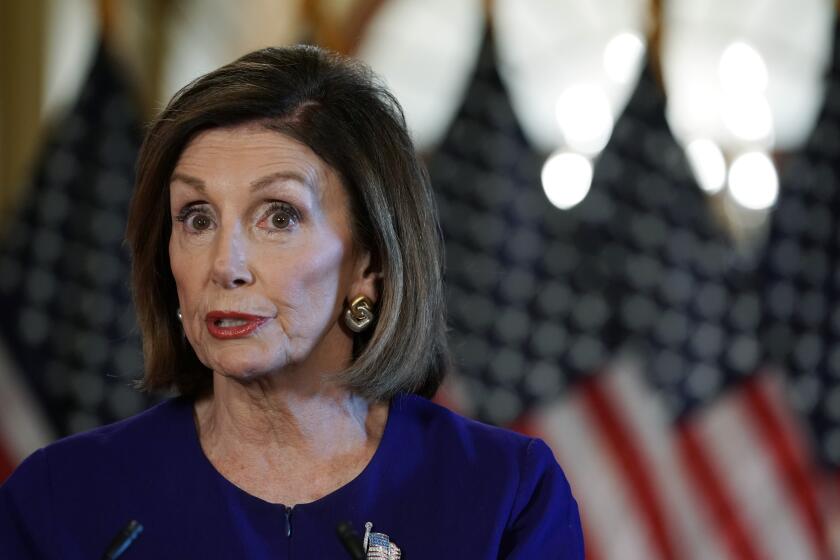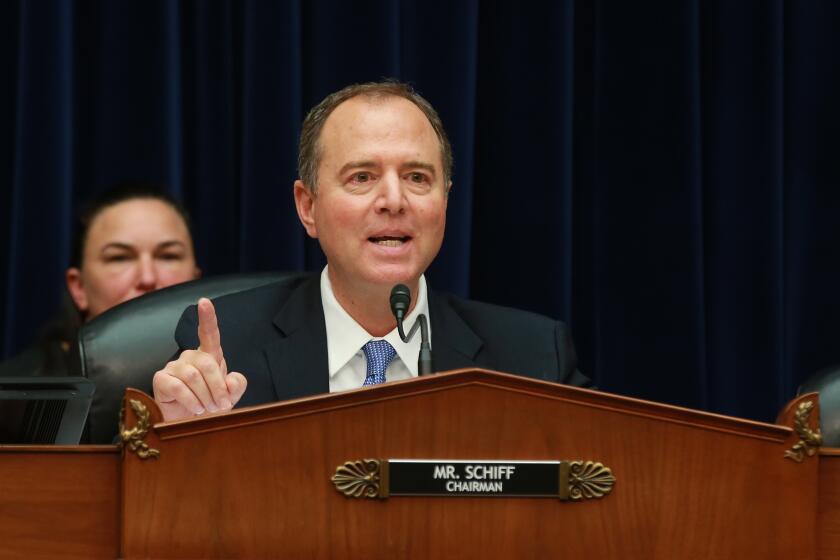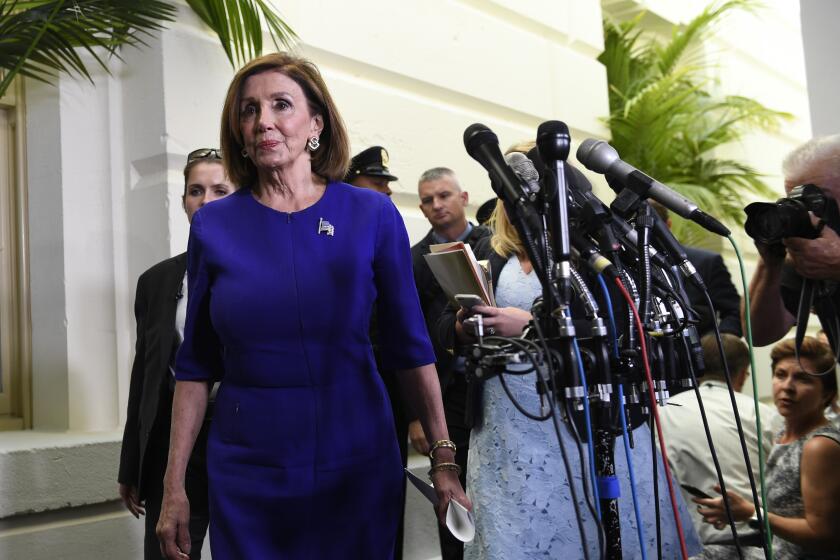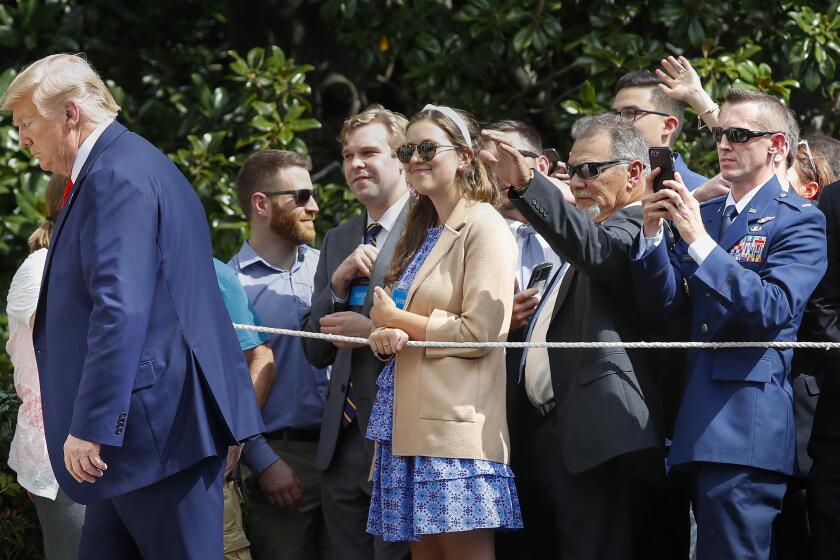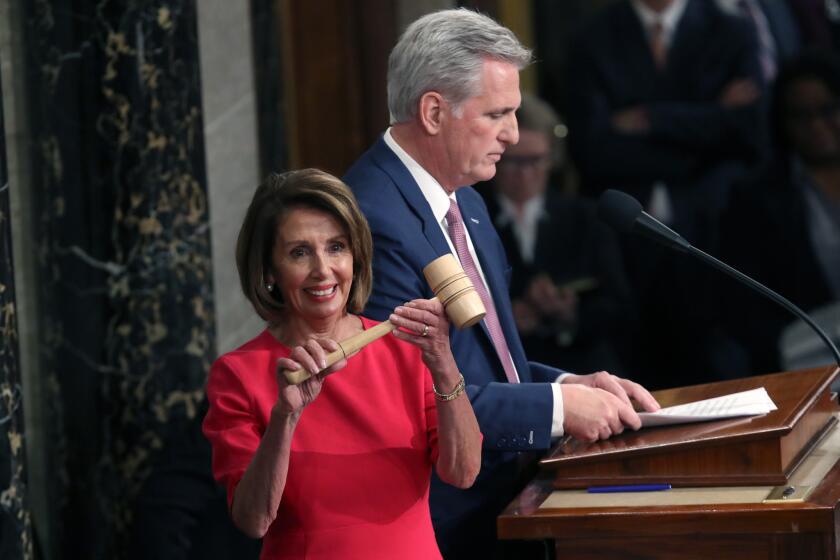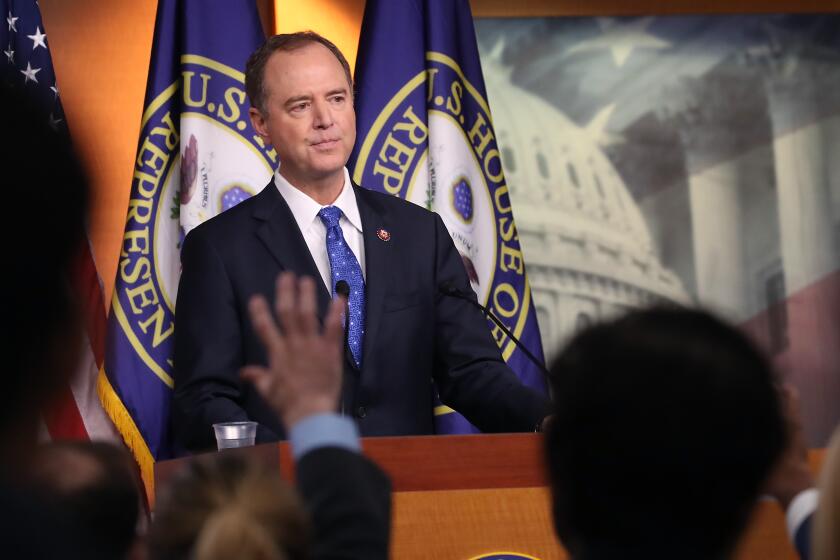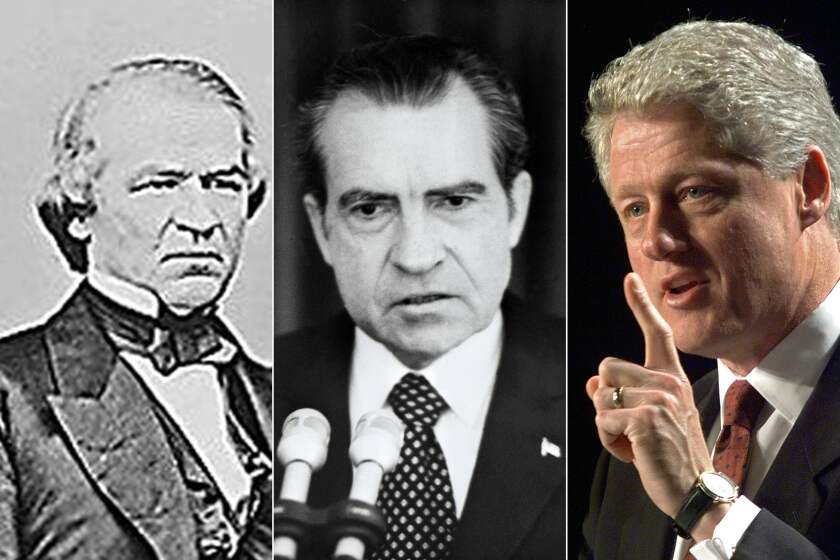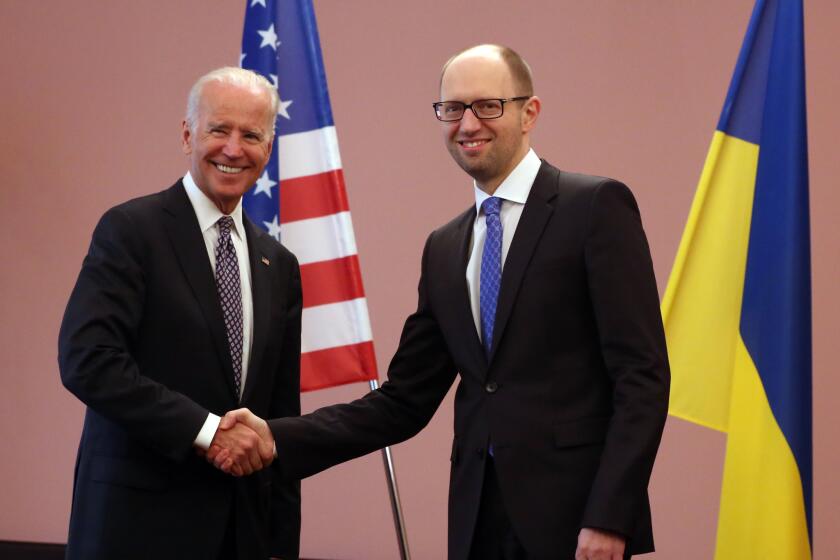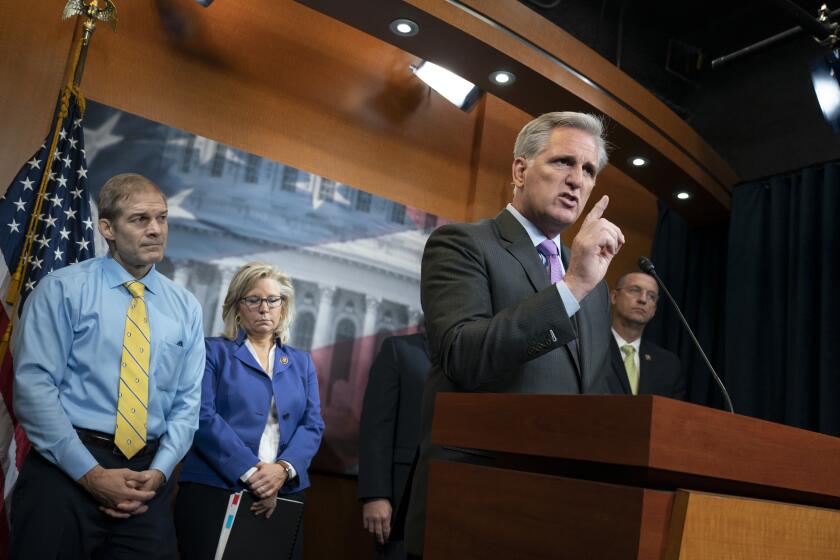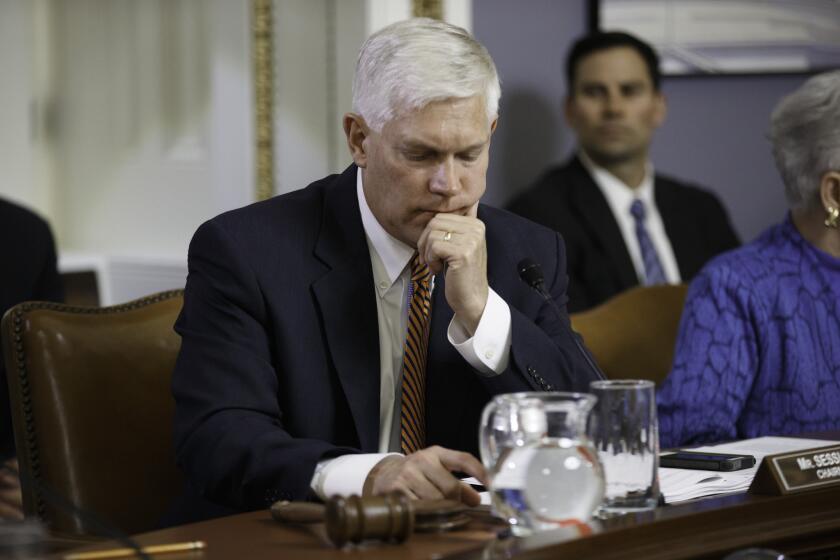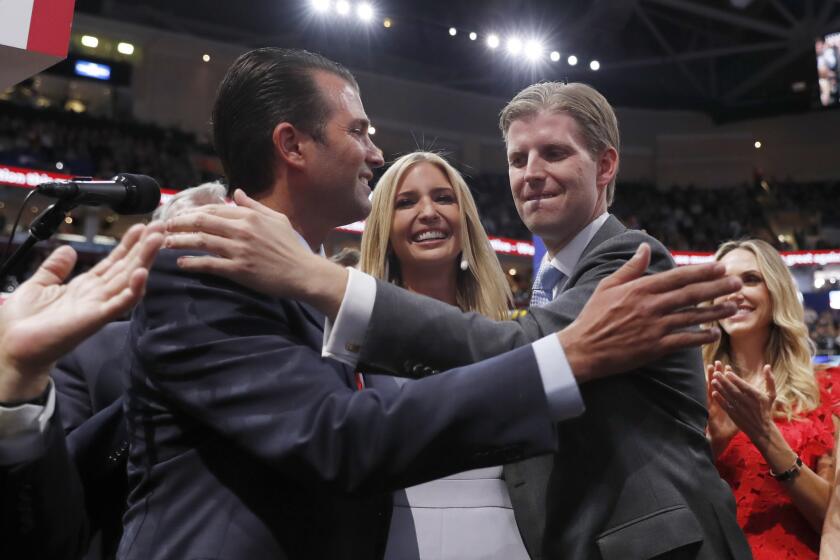Trump impeachment inquiry: A timeline
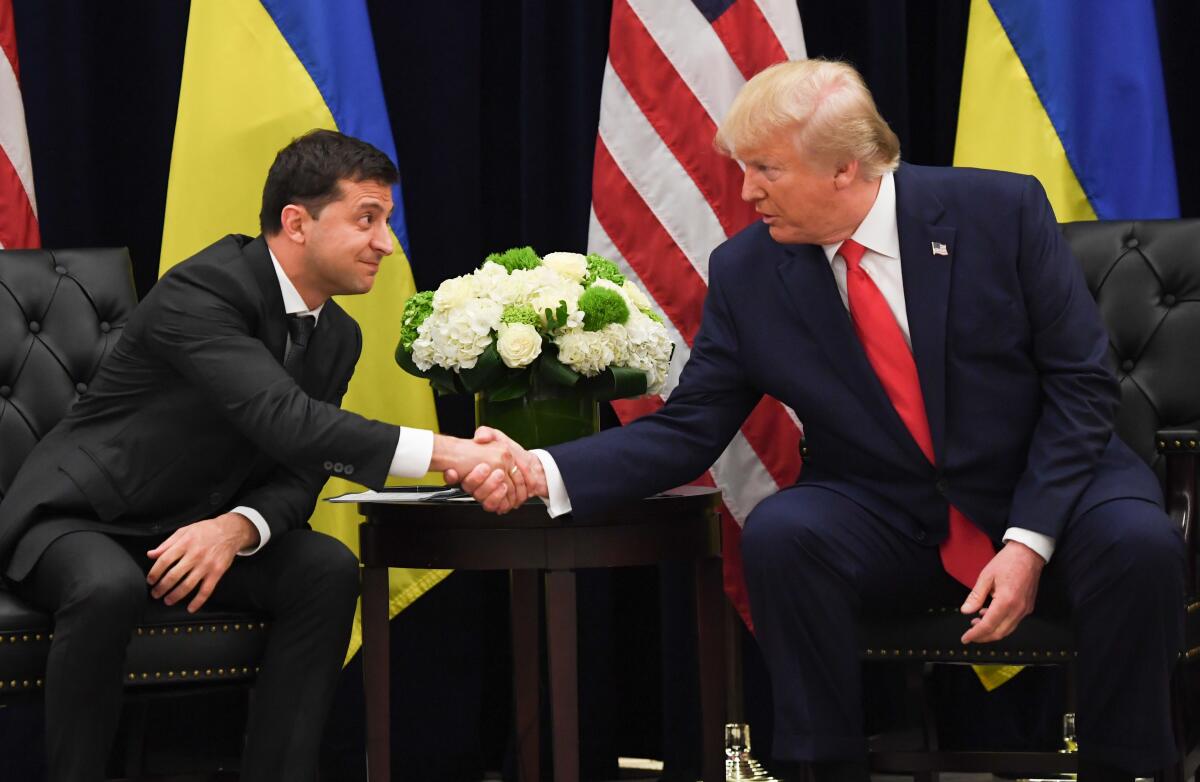
WASHINGTON â A whistleblower, a phone call and critical military aid are what set the House Democratsâ formal impeachment inquiry into President Trump in motion this week.
The investigation is focused on a conversation between Trump and Ukrainian President Volodymyr Zelensky in which Trump pressed Zelensky to investigate former U.S. Vice President Joe Biden, Trumpâs possible opponent in the 2020 presidential election. Trump has acknowledged that at the same time he was withholding aid to the country.
Hereâs a look at some of the main events that led up to the impeachment inquiry and what has happened since the announcement.
2014: The United States becomes one of Ukraineâs strongest allies
President Obamaâs administration begins funneling millions of dollars in aid to Ukraine after the countryâs president, Viktor Yanukovich, was ousted in a 2014 revolution for backing separatists who supported Russiaâs annexation of Ukraineâs Crimean peninsula. With a new but fragile pro-Western government in power, Vice President Biden oversees the effort in which U.S. funds are aimed at boosting Ukrainian armed forces in the face of Russiaâs military involvement.
Months after Biden assumed the role, his son Hunter Biden had joined the board of Burisma Holdings, a private Ukrainian natural gas company â a position that has since raised some concerns about a potential conflict of interest. It was during this period that Burismaâs owner was being investigated by Ukrainian prosecutors over possible financial abuses, although Hunter Biden was not accused of any wrongdoing.
White House officials pointed to Hunter Bidenâs status as a private citizen, and the vice president said his son made his own business decisions.
The House of Representatives intends to vote to impeach President Trump for abusing his office and obstructing Congress, a condemnation that only two other U.S. presidents have faced in the nationâs 243-year history. Despite the historic nature of the vote on charging the president with committing high crimes and misdemeanors, Trumpâs fate has been sealed for days, if not weeks in the Democratic-controlled House.
Late 2015: The Obama administration and its European allies pressure Ukraine to remove its top prosecutor, who led investigation into Burisma
While Vice President Biden represents U.S. interests in Ukraine, the Obama administration and its European allies push to remove the countryâs top prosecutor, Viktor Shokin, as part of a crackdown on corruption â a long-standing problem in the country. As part of the maneuver, Biden threatens to withhold a $1-billion loan guarantee to Ukraine if Shokin doesnât resign.
Shokin had led the investigation into the owner of Burisma, although the inquiry was dormant at the time Biden pushed for the prosecutorâs ousting, the Washington Post reported.
No evidence indicated Biden or his son acted improperly.
How did Ukraine wind up in the middle of calls to impeach Trump? And whatâs at stake?
2016: Shokin is out
In March 2016, Ukrainian officials vote to oust Shokin. The same year, a Kyiv district court finds no evidence of criminal wrongdoing by Burismaâs owner, according to CNBC.
April 2019: Zelensky elected to lead Ukraine
Hunter Bidenâs term on the Burisma board expires and he steps down from the company, according to Reuters.
In the same month, comedian Volodymyr Zelensky is elected Ukraineâs leader. He pledges to focus on ending the war against Russia-backed separatists in the countryâs east.
May 2019: Giuliani skips Ukraine trip after Democrats accuse him of trying to recruit the country to help sway 2020 election
Trumpâs personal lawyer Rudolph W. Giuliani cancels a visit to Ukraine after Democrats denounce his effort to push the country to open investigations that he hoped would benefit Trump politically. Democrats say the plan signaled a clear attempt to recruit a foreign nation to influence a U.S. election.
âWeâre not meddling in an election, weâre meddling in an investigation, which we have a right to do,â said Giuliani in an interview with the New York Times.
July 25: The phone call
Trump directly asks Zelensky for a âfavorâ while discussing U.S. military aid during a July 25 phone call, according to a White House memo that would later be released.
The phone call is one day after former special counsel Robert S. Mueller III testifies before Congress on the nearly two-year investigation he led into Russian election interference in 2016 and potential obstruction of justice.
The Ukraine allegations have breathed new life and focus into an impeachment inquiry that even some Democrats feared was at risk of losing momentum.
Aug. 12: Complaint filed
The whistleblower complaint is filed with the intelligence communityâs inspector general, Michael Atkinson.
Sept. 9: House Intelligence Committee notified of complaint
Atkinson notifies the House Intelligence Committee about the complaint, which he characterizes as âurgentâ and âcredible.â
Sept. 13: Intelligence Committee chairman issues subpoena for complaint
Intelligence Committee Chairman Rep. Adam B. Schiff (D-Burbank) issues a subpoena for Joseph Maguire, the acting director of national intelligence, to appear before the panel after Schiff said Maguire had not transmitted the complaint to Congress within seven days, âin violation of the law.â
As the Democratsâ impeachment inquiry enters an aggressive new phase, Burbankâs Rep. Adam Schiff finds himself once again in a key role.
Sept. 18: Reports emerge that Trump made a âpromiseâ to a foreign leader
The Washington Post reports that the whistleblower complaint is about a conversation between Trump and a foreign leader.
Sept. 19: Intelligence inspector general refuses to tell Congress about whistleblowerâs complaint
The governmentâs intelligence inspector general refuses to discuss the substance of the whistleblower complaint at a closed-door House Intelligence Committee meeting. Trump rejects the report as âfake newsâ and âpresidential harassment.â Some of the whistleblowerâs allegations appear to center on Ukraine, according to reports from the Washington Post and the New York Times.
Sept. 20: Ukraine scandal emerges
Trump defends himself as House Democrats demand the release of the whistleblower complaint. The controversy refocuses attention on Trumpâs attempts to undercut Biden after reports that the president urged Ukrainian officials to investigate Hunter Bidenâs business dealings for possible corruption.
Sept. 24: House Democrats launch an impeachment inquiry
House Speaker Nancy Pelosi (D-San Francisco) announces that the House will begin a formal impeachment inquiry of the president.
âThe actions of the Trump presidency have revealed the dishonorable fact of the presidentâs betrayal of his oath of office, betrayal of our national security and betrayal of the integrity of our elections,â Pelosi says. âNo one is above the law.â

Trump also says he held up delivery of nearly $400 million in military and State Department aid that had been approved by a bipartisan vote in Congress to help Ukraine counter aggression from Russia. The aid was released this month. Trump denied that the two-month delay in releasing the aid was meant to pressure Zelensky.
Mr. President, she told him, âundo it.â With those two words, House Speaker Nancy Pelosi offered Trump one last chance to avoid becoming only the fourth president in office to face impeachment proceedings.
Sept. 25: The memo is released
The White House releases its account of the 30-minute Trump-Zelensky call.
According to the memo, Trump asked Zelensky both to investigate Biden and to look into CrowdStrike, a cybersecurity firm that did work for the Democrats in the 2016 election. Trump asked Zelensky at least five separate times on the call to work with Atty. Gen. William Barr on such investigations. Trump also urged Zelensky several times to speak to Giuliani, the presidentâs personal attorney.

âImpeachment is about restoring honor and integrity to the office.â Thatâs what Lindsey Graham said â in 1999.
Sept. 26: The complaint is released and Maguire testifies
The House Intelligence Committee releases a redacted version of the complaint in which a whistleblower alleges that White House officials took unusual steps to secure the transcript of Trumpâs July 25 call with Zelensky.
âWhite House officials told me that they were âdirectedâ by White House lawyers to remove the electronic transcript from the computer system in which such transcripts are typically stored,â the whistleblower said, according to the complaint. âThe transcript was loaded into a separate electronic system that is otherwise used to store and handle classified information of an especially sensitive nature.â
In the complaint, the whistleblower told the intelligence communityâs inspector general that Trump was âusing the power of his office to solicit interference from a foreign country in the 2020 U.S. election.â
Pelosi characterizes the whistleblowerâs account as evidence of a White House âcover-up.â She says the allegations about Trumpâs contacts with Ukraine would now be the central focus of the Democratsâ impeachment inquiry.
At a contentious House committee hearing Thursday morning, Maguire, the acting director of national intelligence, is criticized by Democrats for initially failing to disclose the whistleblowerâs complaint.
The Los Angeles Times reports that, meanwhile, Trump raged at the Democratsâ new impeachment proceedings and slammed the intelligence officer and the White House aides who helped the whistleblower as âalmost a spy,â and suggested it was treason.

President Trump slammed the whistleblower who first warned that the president was trying to strong-arm a foreign leader for personal gain as âa spy,â and suggested he or she had committed treason.
Sept. 27: Trump demands Schiffâs resignation, Trumpâs special envoy to Ukraine resigns
President Trump calls for Schiffâs resignation after the chairman of the House Intelligence Committee paraphrased the White House memo describing Trumpâs phone call with Ukraineâs leader.
At Thursdayâs committee hearing, Schiffâs opening statement discussed constitutional obligations and comparisons between Trump and mafia bosses. In what he later described as âat least in part, parody,â he also paraphrased the memo released by the White House, which Trump tweeted was âa version of my conversation with the President of Ukraine that doesnât exist.â
âYou engaged in a shakedown to get election dirt from a foreign country. And then you tried to cover it up,â Schiff tweeted in response. âBut youâre right about one thing â your words need no mockery. Your own words and deeds mock themselves. But most importantly here, they endanger our country.â
On Friday evening, Kurt Volker, a former U.S. ambassador to NATO caught in the middle of the whistleblower complaint, resigns from his post as special envoy to Ukraine. A U.S. official said Volker told Secretary of State Michael R. Pompeo of his decision to leave the job, following disclosures that he had connected Trumpâs personal lawyer Rudolph Giuliani with Ukrainian officials to investigate Biden and his family.
President Trump didnât see it coming. And his aides have no plan. Thatâs the situation at the White House three days after Democrats launched an impeachment inquiry.
Sept. 29: Former Ukraine prosecutor says he saw no evidence of wrongdoing by Biden
The Times reports that Ukraineâs former top law enforcement official says he repeatedly rebuffed demands by President Trumpâs personal lawyer, Giuliani, to investigate Biden and his son, insisting he had seen no evidence of wrongdoing that he could pursue.
Yuri Lutsenko said while he was Ukraineâs prosecutor general he had urged Giuliani to launch a U.S. inquiry and go to court if he had any evidence but not to use Ukraine to conduct a political vendetta that could affect the U.S. election.
âI said, âLetâs put this through prosecutors, not through presidents,ââ Lutsenko told The Times.
President Trumpâs allies and Democrats also appear on national talk shows to share stridently opposing views of the impeachment inquiry.
Californiaâs delegation is squaring off against President Trump again, with Speaker Pelosi and Rep. Adam Schiff leading the charge.
Sept. 30: House Democrats subpoena Giuliani
House Democrats issue a subpoena to Giuliani, President Trumpâs personal lawyer and a key figure in the presidentâs push for Ukraine to investigate his political enemies.
Democrats set a deadline of Oct. 15 for Giuliani to provide documents to three House committees, although he was not asked to testify.
If Giuliani does not comply, the letter warns, it would âconstitute evidence of obstruction of the Houseâs impeachment inquiryâ and perhaps become fodder for articles of impeachment against Trump.
Republican leader Mitch McConnell also says that Senate rules would require him to take up any articles of impeachment against Trump if approved by the House, swatting down speculation that the GOP-controlled chamber could avoid it.
âI would have no choice but to take it up,â McConnell said on CNBC. âHow long youâre on it is a whole different matter.â
The Wall Street Journal also reports that Secretary of State Mike Pompeo was among the administration officials who listened in on the July 25 phone call between Trump and Ukraineâs president, suggesting that Americaâs top diplomat was at least familiar with â if not directly involved with â the presidentâs alleged attempt to use foreign policy for personal benefit.
Throughout the day, Trump posts numerous tweets seeking to discredit the whistleblower and the impeachment inquiry.
He also tells reporters, âWeâre trying to find outâ who the whistleblower is, despite the fact that the whistleblower is entitled to federal protections under the law.
Oct. 1: Pompeo pushes back on impeachment investigation
Pompeo says House Democrats are trying to âintimidate, bully and treat improperlyâ current and former officials in seeking information in the Ukraine investigation. He says the officials would not provide depositions to House investigators as scheduled because they had âwoefully inadequateâ time to prepare, and because the request was not made through normal channels. For those who do appear, he demands that executive branch lawyers accompany them.
Democrats respond with fury, saying Pompeo should âimmediately cease intimidating [witnesses] to protect himself and the President.â
Petro Poroshenko, who was Ukraineâs president until May and dealt with both the Obama and Trump administrations, also says in an interview with the Times that he never felt pressure from President Trump or Giuliani to open questionable corruption investigations into Biden. Poroshenko adds that he never felt that Bidenâs 2016 demand that Ukraine fire its top prosecutor stemmed from anything improper or personal on Bidenâs part.
Giuliani, Trumpâs personal lawyer, hires former federal prosecutor Jon Sale to represent him in the inquiry. Sale had worked on the legal team investigating the Watergate scandal.
The road to impeachment is only loosely laid out by the Constitution. Hereâs what it might look like.
Oct. 2: House Democrats threaten to subpoena White House
Pompeo acknowledges Wednesday that he was listening to the phone conversation between Trump and Zelensky on July 25. Pompeo did not respond when asked if the call raised any red flags in his mind.
House Democrats say they will issue a subpoena to the White House by the end of the week if the Trump administration doesnât voluntarily turn over records related to the Trump-Zelensky call.
Meanwhile, President Trump rages. He also publicly repeats his claim that the whistleblower is âa spyâ and vows to âfind out who that person was.â Asked whether the whistleblowerâs anonymity should be protected, Trump told reporters in the Oval Office, âI donât care.â
At a rally in Reno, Biden assured supporters that his message to President Trump is âIâm not going anywhereâ in his most forceful response yet to the presidentâs attacks.
The U.S. is hurtling toward its third impeachment drama in less than half a century. The process seems familiar, but the circumstances are one of a kind.
Oct. 3: Trump calls on China to investigate the Bidensâ business dealings
The president publicly solicits a foreign governmentâs help in front of TV cameras on the South Lawn of the White House when he urges China to investigate Biden and his son, Hunter, amid the impeachment inquiry.
âChina should start an investigation into the Bidens, because what happened in China is just about as bad as what happened with Ukraine,â Trump declared before heading to an event in central Florida.
House Democrats also interview Kurt Volker, a former U.S. diplomat to Ukraine, as part of their impeachment investigation. Volker is the first witness brought to speak under oath in their probe.
Oct. 4: Democrats subpoena the White House
Ukraineâs top prosecutor says his office is reviewing several cases related to the owner of Burisma, the gas company Hunter Biden sat on the board for while his father was leading the Obama administrationâs diplomatic dealings with Ukraine. The prosecutor adds that he wasnât aware of any evidence of wrongdoing by either Biden.
President Trump also says the White House is preparing a formal objection to the Democratsâ impeachment inquiry without an official vote. The letter to House Speaker Nancy Pelosi is expected to say the administration wonât cooperate with the probe without that vote. Trump acknowledges that Democrats in the House âhave the votesâ to begin a formal impeachment inquiry, even if they donât have enough votes to convict him in the Senate.
In a major escalation of the impeachment investigation, House Democrats issue a subpoena to the White House for documents on President Trumpâs dealings with Ukraine and demanded additional records from Vice President Mike Pence.
âThe White House has refused to engage with â or even respond to â multiple requests for documents from our committees on a voluntary basis. After nearly a month of stonewalling, it appears clear that the president has chosen the path of defiance, obstruction and cover-up,â top Democrats write in a letter to Mick Mulvaney, Trumpâs acting chief of staff.
Joe Biden made at least half a dozen visits to Ukraine when he was vice president. Hereâs what he was doing.
Oct. 6: A second whistleblower emerges
Mark Zaid, a lawyer for the original whistleblower, says his team now represents a second whistleblower in the impeachment inquiry against President Trump
Another lawyer on the legal team, Andrew Bakaj, tweets later that the firm is representing âmultipleâ whistleblowers but provides no details on the number, the status of their complaints, or whether they are also part of the intelligence community.
Zaid says the latest whistleblower had direct knowledge of White House dealings with Ukraine.
Trump accuses Pelosi and Schiff of treason.
Oct. 7: House Democrats subpoena Pentagon chief and acting White House budget director
House Democrats issue a subpoena to Defense Secretary Mark Esper and acting White House budget director Russell Vought to examine the reasoning behind the White Houseâs decision to withhold aid appropriated by Congress to support Ukraine.
Oct. 8: White House says it wonât participate in âunconstitutionalâ impeachment inquiry
After the Trump administration blocks top U.S. diplomat Gordon Sondland from giving a voluntary deposition, investigators issue a subpoena that orders him to submit documents and testify.
A full-blown constitutional crisis emerges when the White House says it would refuse to participate in the impeachment inquiry. Signed by Pat A. Cipollone, counsel to the president, the 8-page letter to Pelosi and three committee chairmen, rejects what he called âyour baseless unconstitutional efforts to overturn the democratic process.â said Cipollone. He added that Trump and his administration âcannot participate in your partisan and unconstitutional inquiry under these circumstances.â
In a statement, Pelosi said: âThe White House should be warned that continued efforts to hide the truth of the presidentâs abuse of power from the American people will be regarded as further evidence of obstruction. Mr. President, you are not above the law. You will be held accountable.â
Republicans are calling the impeachment inquiry unfair because the full House didnât vote to start it. A formal vote may offer them greater leverage in the process. Hereâs why.
Oct. 9: Joe Biden calls for President Trumpâs impeachment
For the first time, Biden says Trump should be impeached for abusing his powers in soliciting help for his own reelection.
âDonald Trump will do anything to get reelected, including violating the most basic forms of democracy,â Biden said at a rally in Rochester, N.H. âItâs stunning, and itâs dangerous.â
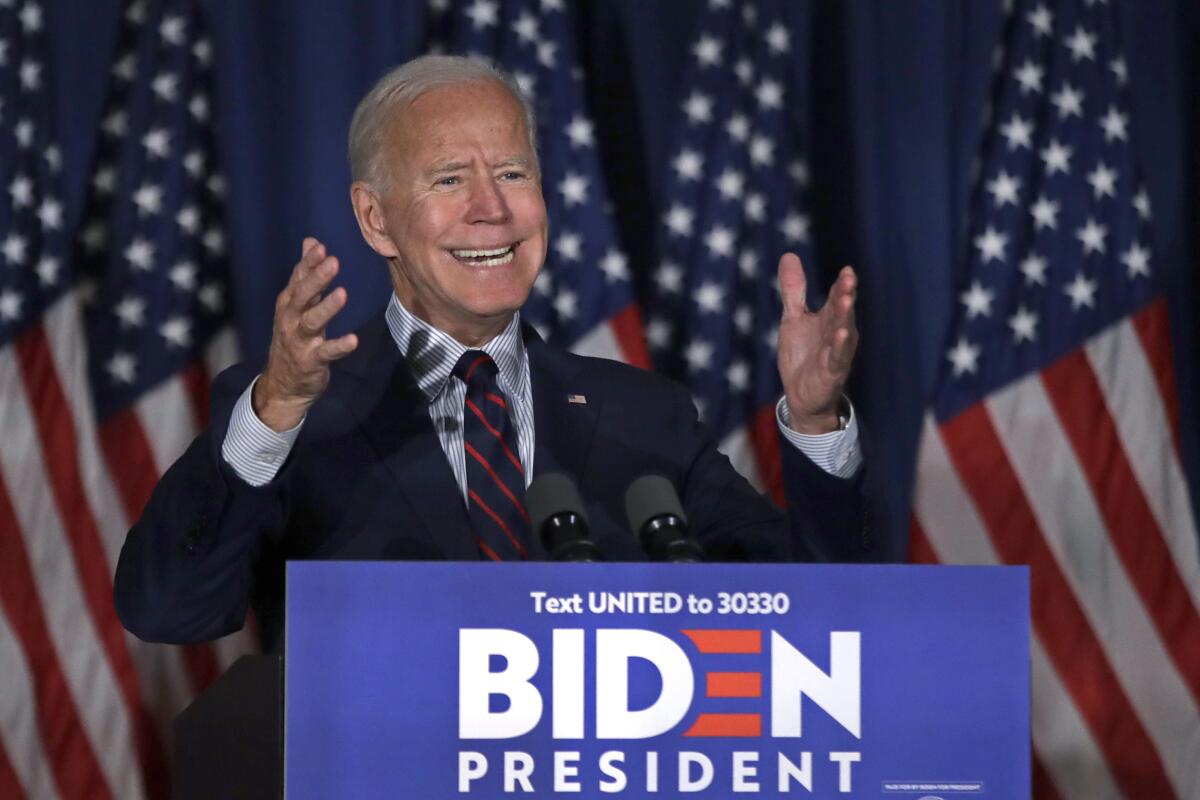
Oct. 10: Giuliani associates arrested
Two associates of Giuliani who were tied to the impeachment inquiry are hit with federal campaign finance charges. Shortly after the arrests were announced, Parnas and Fruman were subpoenaed by House Democrats to provide documents and depositions. They had declined to appear for voluntary depositions and had signaled that they would not meet the requested document deadlines.
Giuliani has publicly said that the Soviet-born political donors helped connect him with Ukrainian prosecutors.
Two men with ties to Rudy Giuliani allegedly lobbied and pledged to raise money for a U.S. congressman for help ousting the U.S. ambassador to Ukraine.
Oct. 11: Former U.S. ambassador to Ukraine testifies
Marie Yovanovitch, the former U.S. ambassador to Ukraine, testifies before lawmakers that President Trump was behind the abrupt decision to oust her from Kyiv in May based on âunfounded and false claims by people with clearly questionable motives.â The closed-door deposition lasted for more than eight hours despite White House efforts to block the veteran diplomatâs testimony, signaling an early victory for House Democrats in their fight for access to witnesses.
Oct. 14: Former White House advisor testifies
Fiona Hill, a former White House aide on Russia, reportedly tells investigators that she had strongly objected to the removal of Yovanovitch and said former national security advisor John Bolton was so unnerved by Giulianiâs involvement in Ukraine that he described him as a âhand grenade who is going to blow everybody up.â
She testified for more than 10 hours behind closed doors.
Oct. 15: Hunter Biden denies accusations of wrongdoing in Ukraine and China
In an ABC News interview, Hunter Biden rejects President Trumpâs claims that he did anything wrong by engaging in foreign work in Ukraine and China.
âI gave a hook to some very unethical people to act in illegal ways to try to do some harm to my father. Thatâs where I made the mistake,â he said. âSo I take full responsibility for that. Did I do anything improper? No, not in any way. Not in any way whatsoever.â
Amid growing political pressure from Republicans, Pelosi (D-San Francisco) reaffirms her stance there would be no House vote on opening an impeachment inquiry for now, even though the investigation is already underway.
Her announcement came as more top White House officials, including Vice President Mike Pence and Energy Secretary Rick Perry, announced their intentions to defy House subpoenas.
George Kent, the deputy assistant secretary of State responsible for Ukraine, also testifies that the White House put Ukraine policy into the hands of Kurt Volker, Gordon Sondland and Energy Secretary Rick Perry â who later called themselves âthe three amigosâ and were viewed as more sympathetic to the president.
President Trump has called Democrat Joe Biden corrupt over his sonâs work in Ukraine while Biden was vice president. Three of Trumpâs own children have conducted a vast array of overseas businesses since he entered the White House.
Oct. 16: Trump attacks Pelosi at in-person meeting
In Trumpâs first face-to-face meeting with top Democrats since the impeachment inquiry launched, congressional Democrats stormed out of a White House strategy session regarding U.S. withdrawal from Syria. Pelosi said Trump had a âmeltdownâ and attacked her as âa third-grade politician.â
Thursday: Mulvaney confirms Trump withheld aid to pressure Ukraine
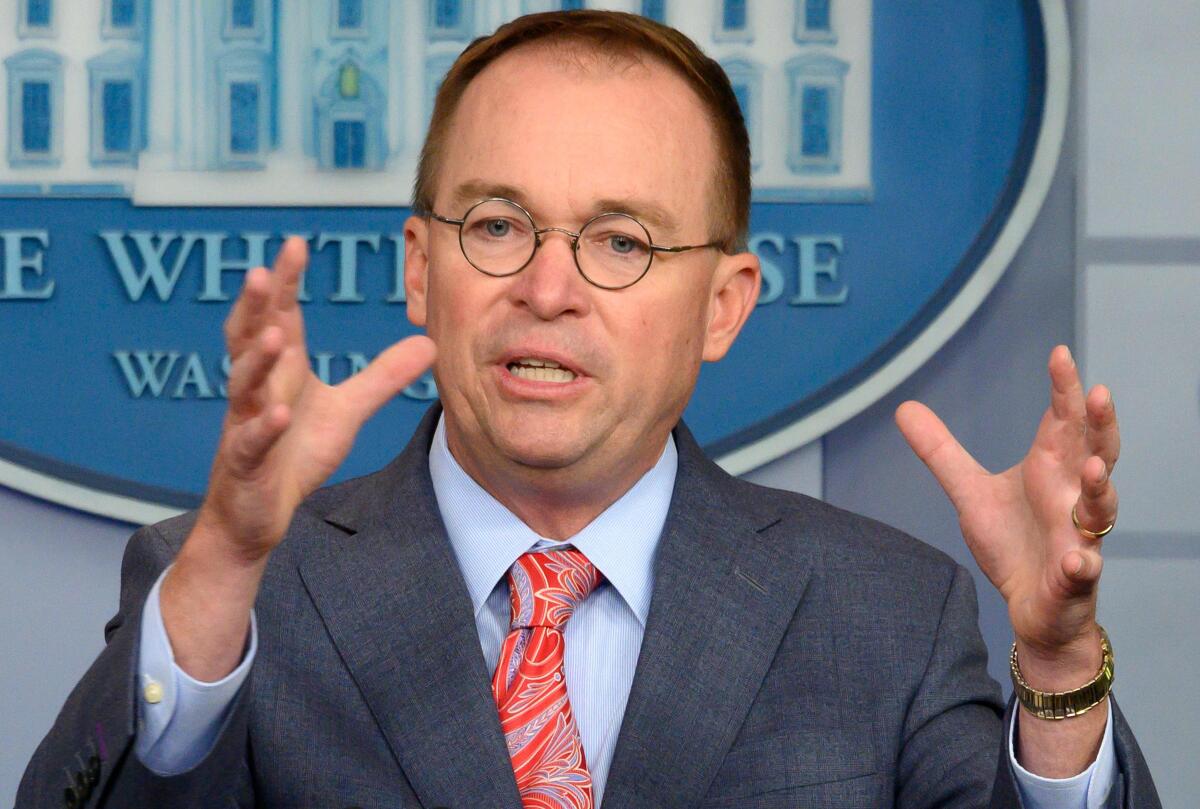
Acting White House chief of staff Mick Mulvaney confirms Trump withheld aid to Ukraine in part to push its new government to investigate Democrats. It was the first time a White House official linked the actions that are at the center of Democratsâ impeachment inquiry into the president.
Separately, Sondland said he disagreed with Trumpâs decision to delegate foreign policy on Ukraine to Giuliani, according to his prepared opening statement to investigators.
âIt was apparent to all of us that the key to changing the presidentâs mind on Ukraine was Mr. Giuliani,â Sondland said. âOur view was that the men and women of the State Department, not the presidentâs personal lawyer, should take responsibility for all aspects of U.S. foreign policy towards Ukraine.â
Perry notifies the president that he intends to resign.
Tuesday: Top U.S. diplomat in Ukraine contradicts Trumpâs claim of no quid pro quo
William B. Taylor, who leads the U.S. Embassy in Ukraine, testifies that President Trump directly linked an order to withhold aid to Ukraine to his demand that Zelensky publicly state that the country would investigate Burisma and examine debunked claims about Ukrainian interference in the 2016 U.S. presidential election. The deposition explicitly contradicts Trumpâs denial of a quid pro quo.
Wednesday: Republicans interrupt a closed-door deposition
About two dozen congressional Republicans crash a secure hearing room at the U.S. Capitol, complaining that the impeachment inquiry led by House Democrats is secretive and partisan. The incident delayed the deposition of Defense Department official Laura Cooper by several hours.
More to Read
Get the L.A. Times Politics newsletter
Deeply reported insights into legislation, politics and policy from Sacramento, Washington and beyond. In your inbox three times per week.
You may occasionally receive promotional content from the Los Angeles Times.
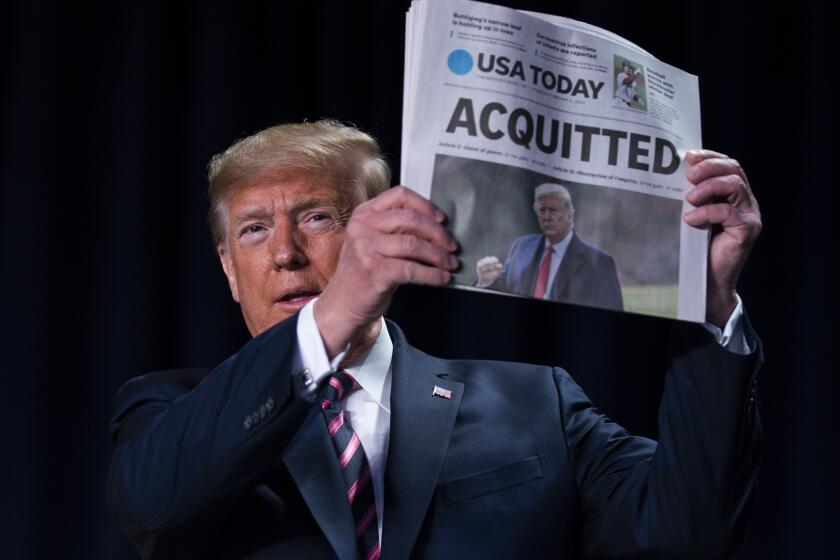
![Ukrainian President Volodymyr Zelensky (L) and US President Donald Trump. [Photo by EPA (L) / AFP (r)]](https://ca-times.brightspotcdn.com/dims4/default/bcd7e2f/2147483647/strip/true/crop/2923x1949+0+26/resize/840x560!/quality/75/?url=https%3A%2F%2Fcalifornia-times-brightspot.s3.amazonaws.com%2Fc2%2Fe3%2Fa8f142054e75aee2c87fecbd6fc1%2Fla-na-pol-us-ukrain.jpg)
